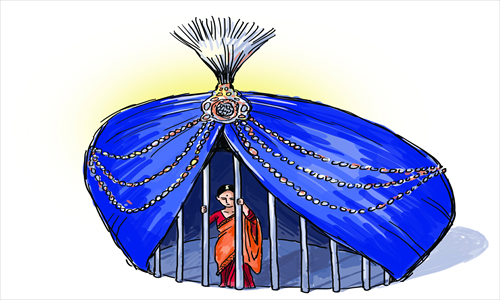Delhi rape a symptom of deep-rooted ills

The gruesome Delhi gang rape and the subsequent passing away of the victim have not only brought the Indian capital to a standstill amid widespread protests, but also raised many questions.
Are women safe anywhere in India? No, they are not, least of all in the capital.
Why don't women feel safe approaching the police? Because there have been instances of girls being raped in police stations by the very people who are there to protect them or of the police siding with the attacker.
Recently, in Patiala in the state of Punjab, a rape victim committed suicide after police refused to register the case, harassed and humiliated her and allegedly offered her money to keep quiet.
So what are our political leaders doing? They are busy passing blame around. They're blaming women for getting raped because of the clothes they wear or because they go out late. One went so far as to call a gang rape in Kolkata a professional transaction between the victim and her attackers.
Better security is the biggest concern right now. The reasons for the need for this security are much deeper and culturally rooted.
Indian society is largely patriarchal in its social norms and practices. Many people, even the most educated, still deem the birth of a daughter as unfortunate, and would readily get rid of a female child even if it was illegal.
Female feticide is widely practiced in the country.
A study published in 2001 by the renowned British medical journal, Lancet, stated that over 10 million fetuses have been aborted in the country in the last two decades. Of the 12 million girls born every year, 1 million do not live to see their first birthday.
Not much has changed since. The latest census report of 2011 shows a slight improvement in the overall sex ratio with 940 females per 1,000 men from the 933 women for every 1,000 men in the 2001 census.
Jhajjar district in the state of Haryana reports a child sex ratio of 774 females per 1,000 males. No wonder it has been alleged that men from various Haryana districts have been increasingly unable to find brides.
As a doctor, I have witnessed first hand this discrimination by society toward its women.
In a well-lit labor room of a Delhi hospital, one woman delivers a boy. The cleaning staff asks for money from the family, who readily give it. The birth of a boy is considered cause for celebration. The cleaning staff doesn't even bother when it's a girl.
Another woman gives birth to twins, both girls. One of the twins is small for gestation age, weighing roughly 500 grams. The parents are told that the baby might not survive. The relief on the father's face is grotesquely visible. Two girls is a problem doubled.
A man waiting outside receives news that his wife has had a baby boy, but the baby has not cried yet and is going into respiratory distress. The man explains that he has two girls and can't afford to lose the boy. It's a prestige issue. He prays to every God he believes in.
In this society, a girl's life is in danger from the time she's in the womb, and it does not get better from there.
The government has conducted campaigns against abortion and sex selection and has implemented laws like the Pre-conception and Pre-natal Diagnostic Techniques Act 1994 which prohibits the prenatal determination of the sex of the fetus.
However, the diminishing number of girls has shown that very little has changed, as the problem is with society at large rather than just a few people.
Hence it's from birth that a girl is branded with the "second-rate human" tag in this society.
The above mentioned practices determine it stays so. So when a woman is eve-teased, abused or God forbid even raped, she most likely will not report the crime for fear of harassment from her family, society and even the police.
It is a society which, with its majority Hindu population, worships numerous Hindu Goddesses and puts them on a pedestal, but still fails to value and protect its women.
The author is a general practitioner and a freelance journalist in India. opinion@globaltimes.com.cn